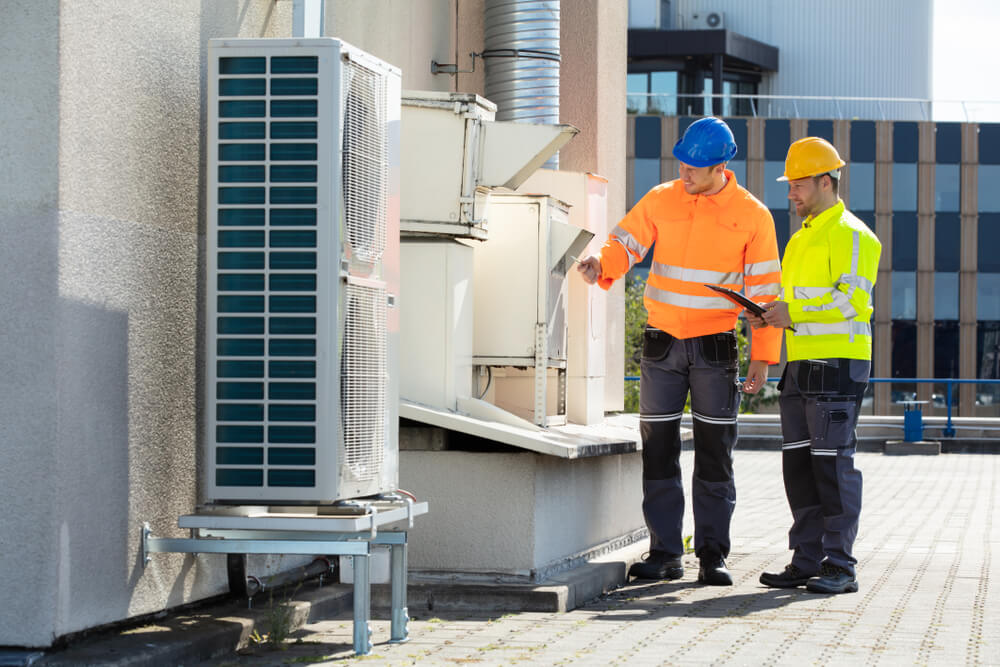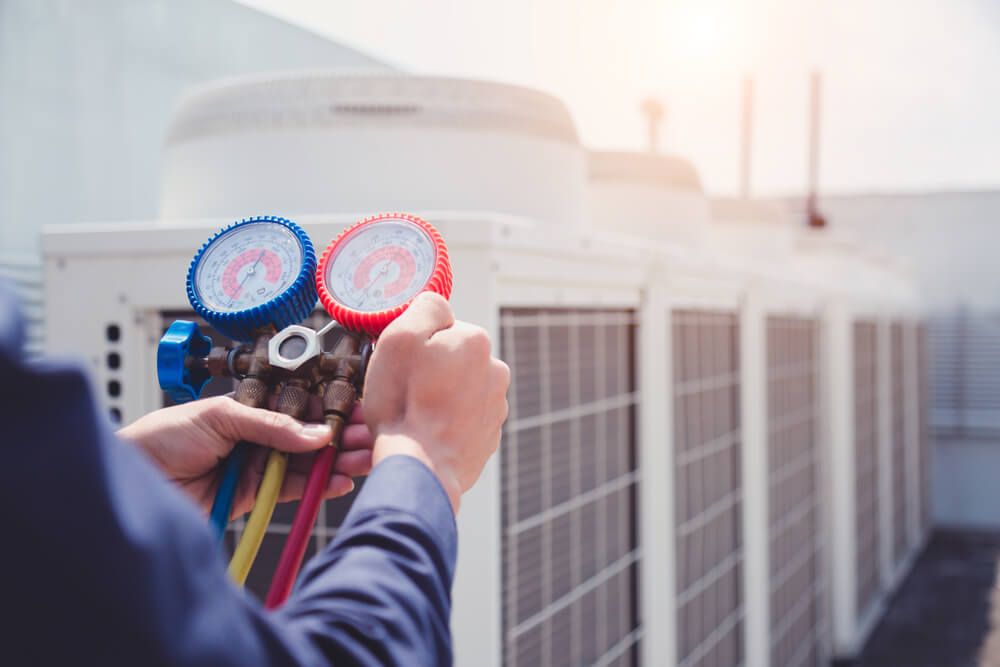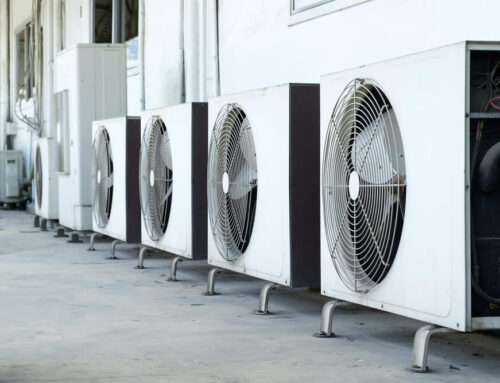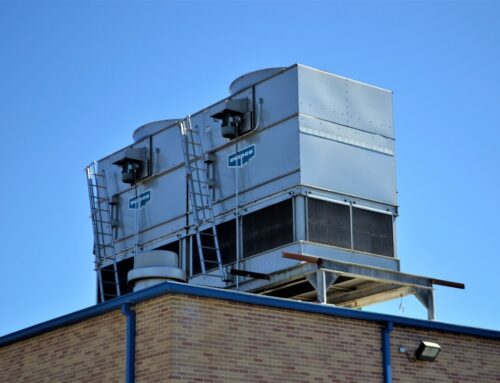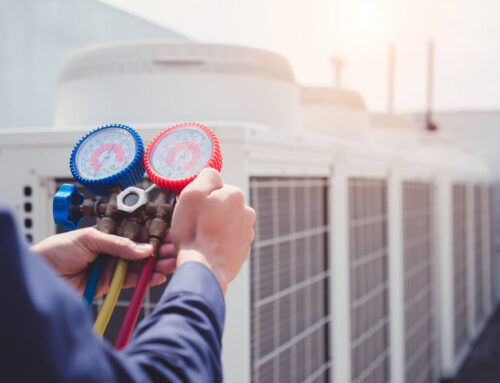Welcome to our guide on Commercial HVAC Maintenance – a journey into the heart of keeping your business environment comfortable, efficient, and cost-effective. Your commercial HVAC system is the unsung hero of your workspace, quietly working to create a conducive atmosphere for productivity. In this comprehensive article, the expert team at Chills Air Conditioning delves into the importance of commercial HVAC maintenance and the benefits of preventative measures and provides you with an essential maintenance checklist to keep your system running smoothly. So, let’s get started on ensuring your business stays cool, warm, and worry-free!
Later on, if you find that you’re in need of commercial HVAC maintenance in Miami, feel free to reach out to us.
The Importance of Commercial HVAC Maintenance
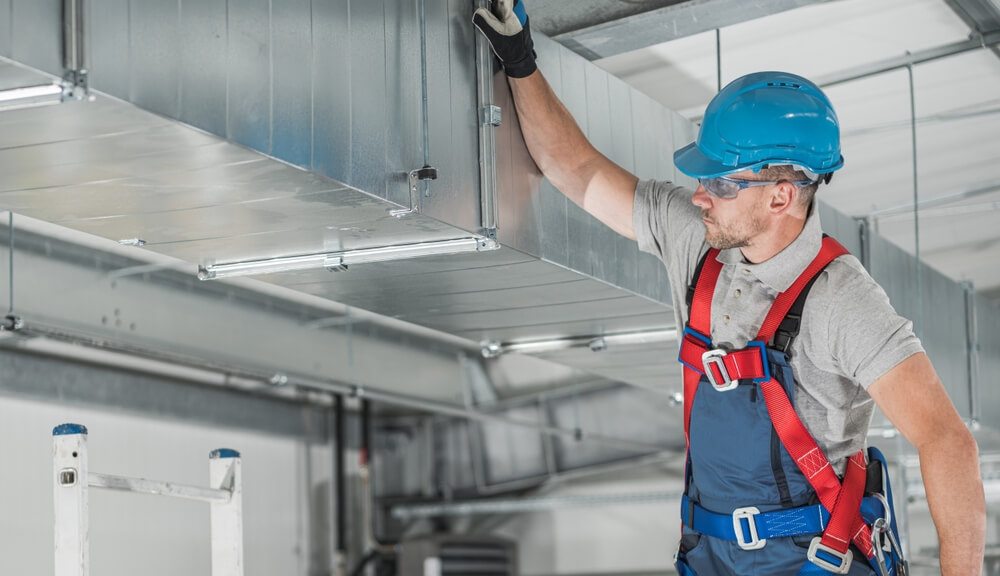
Your commercial HVAC system is more than just a climate control device; it’s a critical asset that directly impacts your business operations. Regular commercial HVAC maintenance is essential for several reasons. First and foremost, it ensures the longevity of your system, protecting your investment in this integral piece of infrastructure. By addressing minor issues before they escalate, you not only extend the lifespan of your HVAC unit but also prevent unexpected breakdowns that could disrupt your business.
Moreover, a well-maintained commercial HVAC system operates more efficiently, leading to lower energy bills. As energy costs continue to rise, optimizing your HVAC system’s performance becomes a strategic move to reduce overheads and improve overall operational efficiency. A properly functioning HVAC system also contributes to a healthier indoor environment, fostering employee well-being and productivity.
Benefits of Commercial HVAC Preventative Maintenance
Cost Savings
Implementing a commercial HVAC preventative maintenance plan is a proactive approach that can save you money in the long run. By addressing potential issues before they escalate, you avoid costly emergency repairs and extend the lifespan of your equipment, ultimately reducing the total cost of ownership.
Moreover, a preventative maintenance plan provides a structured schedule for routine check-ups, ensuring that your HVAC system operates at peak efficiency throughout the year. This proactive approach not only prevents unexpected downtime but also allows for strategic planning of maintenance expenses. In the realm of commercial HVAC, a well-executed preventative maintenance plan is not just a cost-saving measure; it’s a smart investment in the sustained performance and reliability of your business’s heating, ventilation, and air conditioning systems.
Energy Efficiency
A well-maintained HVAC system operates more efficiently, leading to lower energy consumption. Regular inspections, cleaning, and adjustments ensure that your system is running at peak performance, translating to energy savings and a positive impact on your bottom line.
Furthermore, the increased energy efficiency resulting from a well-maintained HVAC system aligns with environmental sustainability goals. By reducing your carbon footprint through lower energy consumption, you contribute to a greener and more eco-friendly operation. Beyond the immediate financial benefits, this commitment to energy efficiency enhances your business’s reputation, demonstrating a dedication to responsible practices that resonate positively with environmentally conscious customers and stakeholders.
Improved Indoor Air Quality
Commercial HVAC systems play a crucial role in maintaining indoor air quality. Regular maintenance, including filter replacements and cleaning, helps eliminate pollutants, allergens, and contaminants, creating a healthier work environment for your employees.
Moreover, prioritizing indoor air quality through routine maintenance not only benefits employee health but can also result in increased productivity and reduced absenteeism. By fostering a clean and healthy workspace, your commercial HVAC system becomes a silent champion in promoting the overall well-being and satisfaction of your workforce.
Enhanced Comfort
Consistent temperature control and optimal airflow contribute to a comfortable working environment. Preventative maintenance ensures that your HVAC system operates seamlessly, providing a comfortable climate for both employees and customers.
Furthermore, a comfortable working environment directly influences employee morale and customer satisfaction, creating a positive atmosphere that enhances productivity and fosters a welcoming ambiance. Implementing preventative maintenance measures, such as regular temperature calibration and airflow adjustments, guarantees that your HVAC system adapts to seasonal changes, ensuring a consistently comfortable space year-round. In this way, your commitment to a well-maintained HVAC system not only meets the immediate needs of your workplace but also contributes to long-term satisfaction and loyalty from both your staff and clientele.
Commercial HVAC Maintenance Checklist
Regular Inspections
Scheduling routine inspections by HVAC professionals is the cornerstone of proactive system care. These scheduled check-ups go beyond mere visual assessments; they involve a comprehensive evaluation of your entire commercial HVAC system. Trained technicians will meticulously examine each component, identifying potential issues before they evolve into costly problems. This foresighted approach not only ensures the longevity of your system but also allows for strategic planning, preventing unexpected breakdowns that could disrupt your business operations.
Filter Replacements
The simple act of regularly replacing air filters is a powerful yet often underestimated practice in maintaining the optimal performance of your HVAC system. Clean filters are essential for preserving good indoor air quality and preventing strain on the system. Over time, filters accumulate dust, allergens, and other particles, hindering airflow and causing your system to work harder than necessary. By adhering to a routine filter replacement schedule, you not only safeguard the health of your employees but also contribute to the overall efficiency and longevity of your HVAC system.
Cleaning of Coils and Fins
Dust and debris accumulating on the coils and fins of your HVAC system can act as barriers to efficient heat exchange and airflow. Regular cleaning, as part of your maintenance routine, is paramount to ensuring that your system operates at peak efficiency. By removing these impediments, you allow for unobstructed heat transfer, reducing the workload on your system and optimizing its overall performance. This small but significant step contributes to energy savings and a more reliable operation of your commercial HVAC system.
Checking Refrigerant Levels
The refrigerant in your HVAC system plays a pivotal role in its overall efficiency. Insufficient or excessive levels can compromise the system’s ability to regulate temperature effectively. Regular checks and adjustments by HVAC professionals are crucial to maintaining the proper balance of refrigerant. This preventative measure not only optimizes energy efficiency but also protects your system from potential damages caused by an imbalance, ensuring that it operates smoothly throughout its lifecycle.
Inspecting Ductwork
Ductwork is the circulatory system of your HVAC setup, and any leaks, blockages, or damage can significantly impact its efficiency. Regular inspections and necessary repairs are essential components of a comprehensive maintenance strategy. Identifying and rectifying issues in the ductwork not only ensures optimal airflow but also prevents energy wastage. A well-maintained duct system contributes to consistent temperature control, creating a comfortable and energy-efficient environment for your business.
Lubricating Moving Parts
Friction in the moving parts of your HVAC system can lead to increased energy consumption and premature wear. Regular lubrication is a simple yet effective practice to ensure the smooth operation of components like motors, fans, and bearings. This preventative measure reduces the risk of breakdowns, extends the lifespan of your system, and contributes to its overall efficiency. The soundless operation resulting from well-lubricated parts also enhances the comfort of your workspace.
Testing Controls and Thermostats
Controls and thermostats are the command centers of your HVAC system, dictating its responses to varying temperature demands. Regular testing ensures that these components are functioning accurately, maintaining precise temperature control and preventing energy waste. This proactive approach allows for the identification of potential issues, such as inaccurate readings or faulty controls, before they escalate into larger problems. By regularly testing and calibrating these elements, you guarantee the energy-efficient operation of your commercial HVAC system, providing a comfortable environment for your employees and customers alike.
Conclusion
Commercial HVAC maintenance is not just a checklist; it’s a strategic investment in the seamless operation of your business. By prioritizing regular inspections, preventative measures, and adhering to a commercial HVAC maintenance checklist, you’re not only safeguarding your equipment but also contributing to a healthier, more productive work environment. Remember, a well-maintained HVAC system is the silent guardian of your business’s comfort and efficiency – let’s keep it that way!

